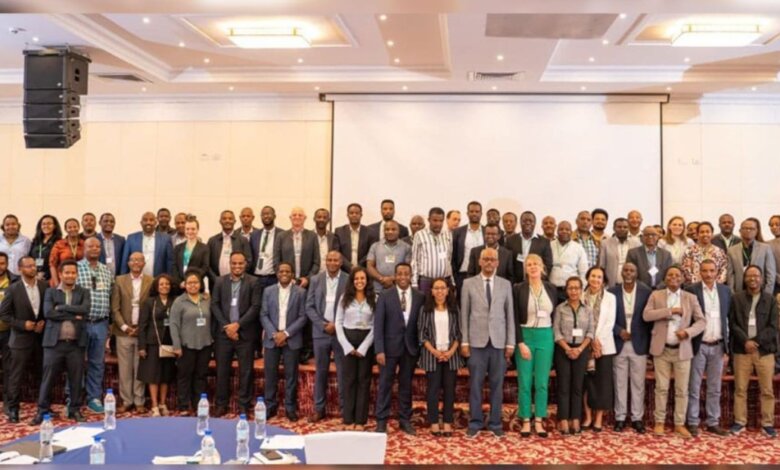
In Ethiopia, where agriculture is the lifeblood of the economy, employing 70 percent of the population and fuelling over 40 percent of the nation’s GDP, a new initiative promises to redefine the sector’s trajectory.
Netherlands’ IDH (Initiatief Duurzame Handel — The Sustainable Trade Initiative) in collaboration with the Norwegian government has launched the Value Chain Transformation (VCT) program—an ambitious effort to reshape Ethiopian agriculture by fostering sustainable growth, empowering farmers, and revolutionizing market access.
Unveiled on February 20, 2025, at the Haile Grand Hotel, the program is poised to bring a paradigm shift to food value chains in Ethiopia and Tanzania. By championing a private-sector-led model, the initiative aims to not only enhance food security but also create a thriving agricultural landscape that blends tradition with innovation.
The launch event buzzed with energy as a diverse assembly of stakeholders convened—government officials, financial institutions, tech pioneers, farmer organizations, global development partners, and private sector trailblazers. A thought-provoking panel discussion featuring industry experts dissected Ethiopia’s agricultural challenges and explored pathways to a more resilient future.
Panellists underscored a critical truth: sustainable transformation demands a holistic approach that intertwines environmental responsibility, social inclusivity, and economic viability. IDH highlighted its successful collaborations with industry giants like SAMANU, Heineken Ethiopia, and BGI—partnerships that have already equipped businesses to meet evolving market demands, benefiting both farmers and consumers.
At the heart of the VCT program lies a commitment to dismantling bottlenecks across the entire agricultural spectrum—from raw materials to finished products. The initiative embraces cutting-edge technologies, innovative market strategies, and robust capacity-building programs to elevate Ethiopia’s agricultural sector.
With a sharp focus on high-growth areas, the program charts its course through five transformative pathways: fostering collaborative coalitions, transforming value chains, facilitating investment, building resilient production landscapes, and generating actionable intelligence. IDH also champions Africa’s push toward agro-industrial self-sufficiency, arguing that local food processing industries are pivotal for economic development, job creation, and lasting food security.
While IDH runs similar programs across eight nations, Ethiopia’s journey into this transformation began just two years ago—driven by the belief that the country holds vast, untapped potential. The VCT initiative’s ethos, encapsulated in the mantra “growing together,” is a rallying cry for food security and economic empowerment.
IDH representatives underscored that for Africa to attain food security, it must boost food production. They pointed out that over 95 percent of food in Ethiopia is produced and consumed by small-scale farmers. Efficient, affordable, and unrestricted food distribution remains crucial, and investment in local food companies is imperative, given that food security is a regional challenge.
Speaking at the event, Mitiku Ayele (PhD), an advisor to the State Minister for Natural Resource Development at the Ministry of Agriculture, reiterated the sector’s vital role. “Agriculture remains the heartbeat of Ethiopia’s economy, providing around 70 percent of employment, contributing 46 percent to GDP, and serving as a primary source of foreign exchange,” he said.
Despite its prominence, the agricultural sector faces formidable obstacles. Mitiku pointed to low productivity, post-harvest losses, and limited market access as persistent barriers stifling farmers’ potential. “This program is designed to integrate smallholder farmers into competitive value chains while championing climate-smart and regenerative agricultural practices, fostering public-private partnerships,” he affirmed.
As discussions unfolded, one resounding theme emerged: collaboration and innovation will be the driving forces behind Ethiopia’s agricultural renaissance. Keynote speakers at the event underscored the crucial role of manufacturers in advancing the program’s objectives, stressing the importance of collaboration and innovation in overcoming sectoral challenges.
It was said that the program is about addressing critical gaps along the entire value chain—from farm to market. Stakeholders reaffirmed their commitment to ensuring the initiative’s success, promising to work collectively to create lasting economic and social impacts while enhancing food access and agricultural productivity across Ethiopia.
As the architect behind the VCT program, Mascha Middelbeek, IDH’s Value Chain Transformation Program Director, underscored the initiative’s mission: reshaping food systems and value chains through private-sector leadership. Private companies, she explained, serve as pivotal entry points and catalysts for change.
“We are out here to drive impact—impact on food security, people, and farmers,” she said. “We select companies with a shared impact ambition with IDH. The selected companies are those truly committed to making agriculture more sustainable by including more farmers in their supply chains and producing higher-quality products. So, having a shared impact ambition is a key selection criterion.”
Beyond a commitment to sustainability, she emphasized that selected companies must demonstrate the ability to scale, withstand market pressures, and maintain sound business governance and financial sustainability. “We don’t just look for partners—we look for companies willing to invest in themselves, where they can achieve the most” she said. Middelbeek emphasized that IDH continuously evaluates companies’ performance and success based on measurable results.
Inclusivity is also a cornerstone of IDH’s strategy. Companies must actively integrate small-scale farmers, women, and youth into their supply chains, providing better income opportunities. “If these shared impact goals and vision are not aligned between the program’s participating companies, it becomes a no-go program,” she said.
Among IDH’s key partners in Ethiopia is SAMANU, one of the country’s leading agribusiness groups. Malick Coulibaly, Chief Agricultural Officer at SAMANU, highlighted the company’s six-year collaboration with IDH. “IDH finances agricultural operations and helps structure our approach to working with farmers,” he noted. “Beyond tackling core challenges, IDH also facilitates improved access to fertilizers and other critical inputs.”
However, Coulibaly pointed to a persistent challenge: middlemen disrupting the value chain. “They manipulate prices, hold back products, and conceal volumes, creating artificial shortages and inflating costs,” he explained. “This interference is significantly impacting productivity and profitability. The VCT program has the potential to achieve more, but we need government intervention to prevent these market distortions.”
IDH, The Sustainable Trade Initiative, is a Netherlands-based foundation focused on transforming global markets to foster more sustainable and inclusive value chains. Operating across sectors like agriculture, forestry, and textiles, IDH prioritizes environmentally friendly solutions and ethical sourcing. In agriculture, the organization has been instrumental in increasing the productivity and sustainability of key commodities such as coffee, tea, and cocoa.
The VCT program is expected to be a game-changer for Ethiopia’s agricultural landscape, driving long-term transformation by promoting sustainable practices, expanding market access, and improving farmer livelihoods. Ultimately, it aims to fortify food security and enhance the nation’s economic resilience.
Source: The Reporter

This article is published by either a staff writer, an intern, or an editor of TheAfricanDream.net, based on editorial discretion.





